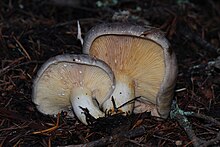Lactarius pallescens is a Western North American "milk-cap" mushroom, of which the milk turns violet when the flesh is damaged. The fungi generally identified as L. pallescens are part of a complex of closely related species and varieties which have a peppery taste and are difficult to delimit definitively.[1]
| Lactarius pallescens | |
|---|---|

| |
| Scientific classification | |
| Domain: | Eukaryota |
| Kingdom: | Fungi |
| Division: | Basidiomycota |
| Class: | Agaricomycetes |
| Order: | Russulales |
| Family: | Russulaceae |
| Genus: | Lactarius |
| Species: | L. pallescens
|
| Binomial name | |
| Lactarius pallescens Hesler & A.H. Sm. (1979)
| |
| Lactarius pallescens | |
|---|---|
| Gills on hymenium | |
| Cap is flat or depressed | |
| Hymenium is subdecurrent | |
| Stipe is bare | |
| Spore print is white | |
| Ecology is mycorrhizal | |
| Edibility is unknown | |
The gray-brown cap ranges from 3 to 10 cm in width, with a mucilaginous surface,[2] whitish flesh and white latex. The gills are whitish and sometimes slightly decurrent.[2] The viscid stalk ranges from 3 to 8 cm long and 1 to 2 cm wide. The spores are pale yellow to orange, elliptical, and bumpy. The flesh of the mushroom stains lilac.[3] In age, reddish stains develop.[2]
Distribution
editLactarius pallescens is found on the West Coast of the United States. In the Pacific Northwest, it can be found in conifer forests.[2]
Related species
editLactarius uvidus (a close relative)[3][2] and Lactarius californiensis are similar.
See also
editReferences
edit- ^ Wood, Miichael (2013 January). Lactarius pallescens. On the MykoWeb.com Web site: [1]
- ^ a b c d e Trudell, Steve; Ammirati, Joe (2009). Mushrooms of the Pacific Northwest. Timber Press Field Guides. Portland, OR: Timber Press. p. 58. ISBN 978-0-88192-935-5.
- ^ a b Davis, R. Michael; Sommer, Robert; Menge, John A. (2012). Field Guide to Mushrooms of Western North America. Berkeley: University of California Press. p. 95. ISBN 978-0-520-95360-4. OCLC 797915861.